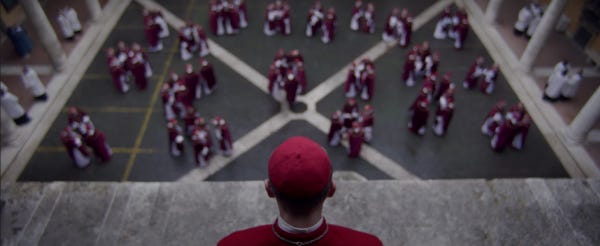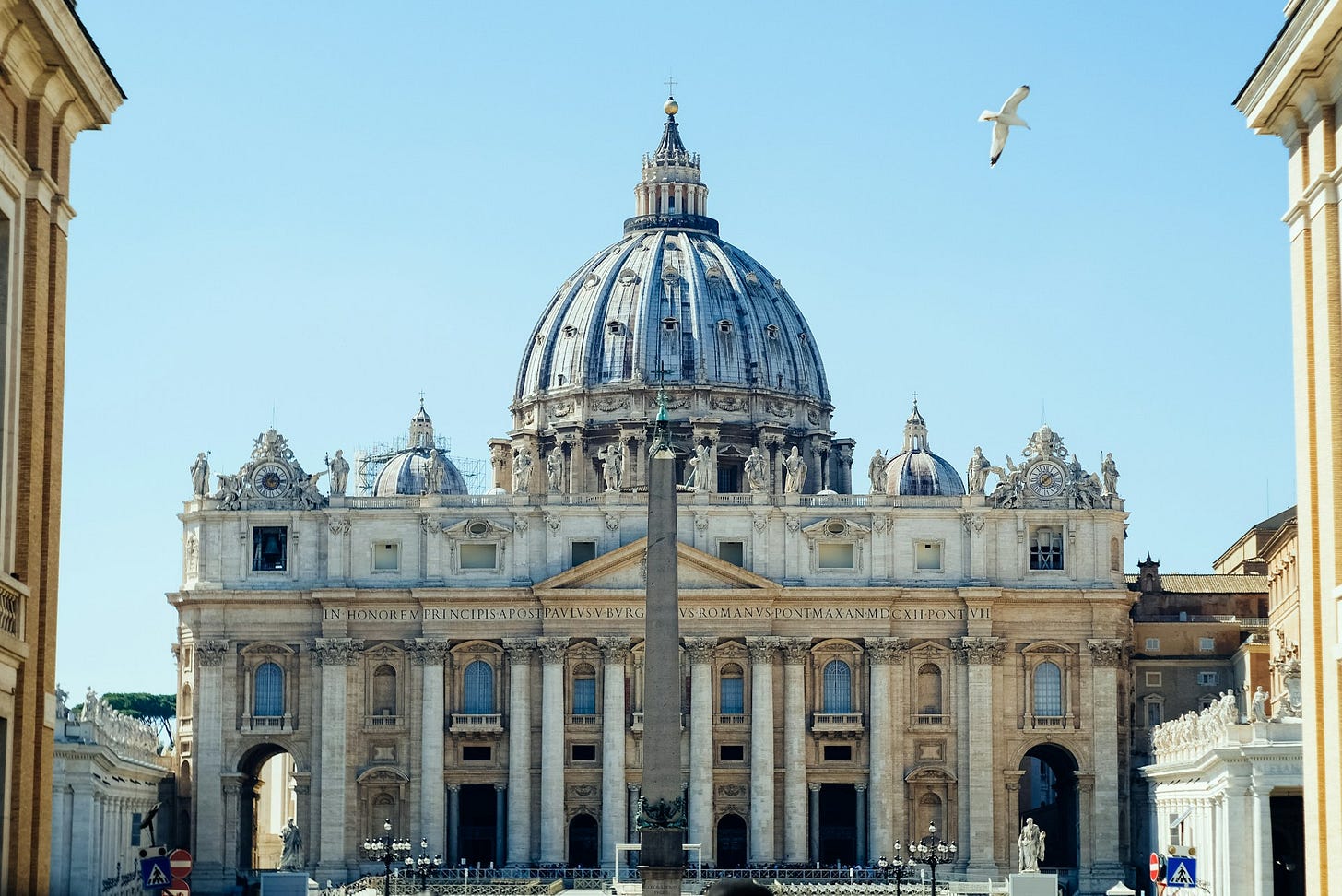Challenges of the Church Are Much the Same as Society’s
The insight of Edward Berger's new movie on papal elections is that we would do well to relinquish our recent adoration of certainty.
While the world is getting ready for the next conclave in Vatican to choose the new head of the Catholic church, and I went ahead and joined a screening of Edward Berger’s much-acclaimed new film Conclave, based on Robert Harris’ novel by the same name. I will not delve much into the artistic merit of the film itself here, apart from stating that the creation is certainly in possession of both its strengths and deficiencies – top-class acting and excellent cinematography set up against a rather superficial and, as could be argued, ideologically flavored ending, for example. But what I actually want to talk about here is something different. The greatest highlight of the movie was for me the speech given by its central character, dean of the College of Cardinals, Father Thomas Lawrence, portrayed by Ralph Fiennes.
Addressing fellow cardinals before the commencement of the conclave, he says, “Let me speak from the heart for a moment. St Paul said, be subject to one another out of reverence for Christ. To work together, to grow together, we must be tolerant – no one person or faction seeking to dominate another.” He then confesses even more insightfully, “In the course of many years in the service of our mother, the Church, let me tell you, there is one sin which I’ve come to fear above all others: certainty. Certainty is the great enemy of unity. Certainty is the deadly enemy of tolerance. Even Christ was not certain at the end. “My God, my God, why have you forsaken me?” he cried out in his agony in the ninth hour on the Cross.”
The long temptation of power
It is interesting that Wikipedia classifies Conclave as a ‘political thriller’. Why ‘political’, one might wonder, for the only politics going on in the film is that between the presumed factions of the Catholic church itself, not mundane politicians or social ideologues. Yet one of the things Berger’s new film succeeds in reminding us of is how, despite their clerical status, church leaders are in essence cut from quite the same ‘wood’ as anyone else. Hence, the same temptations haunt them that haunt us – temptation of power as one of them. Church, which, within its own structure, can offer its leaders quite absolute power, can thereby be even more tempting in that appeal than many of the worldly leadership positions. In other words, the temptation to have power can really be subdued only in the heart, and no amount of religious attributes, or ideological dogma, can rid one of it.
The challenges standing before the Church today are thus much the same as those standing before the society at large. Lust for power can manifest itself in a great variety of forms and doesn’t pertain only to those in a formal position of power. It can manifest itself in the flair of superiority, considering oneself better than others. It can manifest itself in the lust for the said certainty, tempting one to assert his or her will or worldview upon others. And somehow, it seems, the bait of certainty has become all too appealing again to many in today’s world. Often enough, that certainty is now called science, being at times presented as the antidote to (the naivety of) faith and the church’s misuse of its (misleading) power.
Such loss of ‘faith’ is not without foundation, and yet might it not be true that even science needs faith, when choosing who to believe and who not on any given matter. Or, in a wider philosophical sense, when considering the famous statement of one of the great revolutionaries of science in the 20th century, Albert Einstein, who said, ‘There are only two ways to live your life – one is as though nothing is a miracle, the other is as though everything is a miracle’. (Can a miracle be an objective fact though – a ‘certainty’?)

An even more modern name for such certainty is ‘scientific consensus’. This is what was said to justify the draconian Covid measures, this is what is claimed to stand behind the climate policies threatening the livelihoods and the individual choices of many. (And yet at least the first should act as a warning – it wasn’t that long ago that we were told with ‘certainty’ that each Covid shot stops the infection, let alone transmission, which it obviously didn’t.) ‘Scientific consensus’ – though intrinsically at odds with the scientific spirit of progressive, i.e. ongoing exploration and debate – has hence become the new argument to allow one to claim certainty over others. It is a lever to force someone to do something, or then again ban them from doing something. And even if the statistics or facts don’t align, certainty still claims its dominance, for it is really a shapeshift guise for desiring power.
The beauty of doubt
Yet the same ‘concensus’ is attributed another worrisome characteristic. Presumed to be objective, it is told to bring us unity in a society divided by mere opinions and beliefs – ‘consensus’, as certainty, cannot be wrong and therefore needs to be subjected to, we’re told. And yet according to Conclave’s protagonist Father Lawrence, such a goal and means are insurmountably at odds with each other. “Certainty is the great enemy of unity,” he says. For it is precisely the self-presumed certainty that allows one to shut out those whose understandings do not coincide with one’s own. “Certainty is the deadly enemy of tolerance,” says the character of Father Lawrence as well, for claiming absolute certainty there is no longer any need to be tolerant towards dissenters – it will function as an entitlement to be an overlord, to reward and punish others. After all, why should one be tolerant towards something, or someone, that one knows ‘with certainty’ to be in the wrong? The very need for tolerance only begins with being faced with opposition, or difference of view.
It is not hard to see certainty as one of the sins of the church itself in the past – it was ‘certainty’ which allowed it to drive witches to a pyre or expel the ‘unfaithful’ from the society. And yet it seems, quite remarkably, that the same ideologues who distanced themselves from the church in the name of greater fairness and inclusion can well fall prey to the same temptation of ‘certainty’ in a different way. Perhaps the great appeal of ‘certainty’ is in itself a sign of society’s divergence from one of the great original purports of the church, or religion – the acknowledgement of a vertical dimension of our existence. Acknowledgement of something unknowable. Something that is a mystery. Or a miracle.
For the last couple of centuries, but maybe post WW II in particular, the Western society has sought its redemption in knowing. Yet it seems to have come with the price of forgetting how not knowing, or recognising the unknowable, can at times be redeeming or liberating as well. And how there can be more fluidity and openness in a doubt than there is in certainty, which is often an illusion anyhow. “Our faith is a living thing,” Father Lawrence states in the movie, “precisely because it walks hand in hand with doubt. If there was only certainty, and no doubt, there would be no mystery and therefore no need for faith.”
Not of the church myself, I don’t feel myself in a position to pronounce or forecast what the new Pope, elected in the coming weeks, will or should be like. In many ways, it seems to me, the old religions, and Christian faith among them, might benefit from moving in two directions at once – on the one hand, asserting its faithfulness to the tradition and not diluting it for popularity, and yet on the other, shedding the load of its vestiges which no longer speak to common people. The need is, perhaps, to return to the deeper core instead of the external attributes of pomp and resplendence. “Let us pray that God will grant us a pope who doubts. And let Him grant us a pope who sins and asks for forgiveness, and who carries on,” hopes the protagonist in the movie. And this, I reckon, is not a bad reference point.
Instead of an image of untouchable divinity, it is perhaps time to return to a more humane face of faith. One that can doubt and err, that can ask for forgiveness and yet pursue onward. One that can explain faith without asking one to submit to certainty. And one that can hence remind the faithful, as well as the society at large, of one of the most precious gifts of life, or God – independence of heart, which alone is what makes love, or truth possible.



